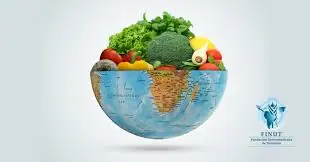Advertisements
Uncovering the secrets of healthy eating is essential for those seeking a more balanced and happy life. In a world full of contradictory information, it is common to come across myths and truths that can confuse even the most dedicated. This text aims to clarify these issues, offering valuable and well-founded insights to help you make informed decisions regarding your diet and lifestyle.
Many people wonder whether it is really necessary to eliminate entire food groups or follow restrictive diets to achieve optimal health. Is gluten really the villain? And are organic products really superior? Here, we will address these and other questions, debunking popular concepts and presenting scientific facts that may surprise you.
Advertisements
In addition to demystifying, this guide also proposes practical and accessible solutions for incorporating healthy eating habits into your daily life. After all, it is possible to balance pleasure and health in your diet without giving up flavors and cultural traditions. Learn how to put together a balanced meal, understand the importance of hydration and discover superfoods that can enhance your well-being.
However, the journey towards a healthy diet should not be seen as a daunting task. On the contrary, it is an opportunity to explore new ingredients and recipes, as well as an invitation to a greater connection with the body and mind. By adopting small changes, the benefits can be felt in many areas of life, from energy at work to the quality of sleep.
Advertisements
Finally, for those who wish to deepen their knowledge, this text brings recommendations from experts, case studies and inspiring testimonials. It's time to transform your relationship with food, seeking not only health, but also happiness and satisfaction in every meal. Let's go together on this journey towards a healthier and fuller life? 🌱

Debunking Food Myths
The Truth About Carbohydrates
Carbohydrates are often seen as the villains in diets, but this perspective deserves a careful review. It is important to understand that not all carbohydrates are created equal. There are simple carbohydrates, found in processed foods and foods rich in sugar, which can actually be harmful to health when consumed in excess. On the other hand, complex carbohydrates, found in whole grains, legumes and vegetables, are essential for providing sustainable energy to our bodies. These foods are rich in fiber, vitamins and minerals that help maintain a healthy digestive system and regulate blood sugar levels.
The secret is balance and choosing healthier sources of carbohydrates. Replacing white breads and pastas with their whole grain versions, adding quinoa and oats to meals, and eating fruits in moderation are effective steps to incorporate carbohydrates into your diet in a beneficial way. Remember that our brain needs glucose, and carbohydrates are the main source of this essential nutrient. 🍞🥦
Demystifying fats
Another common food myth involves fats. For years, fats have been considered the main culprit in weight gain and heart disease. However, recent research reveals that the type of fat you consume is what really matters. Trans fats and saturated fats, found in processed foods and fried foods, are harmful and should be avoided. However, unsaturated fats, such as those found in olive oil, avocados, and nuts, are beneficial for your heart and may even help lower bad cholesterol.
Additionally, omega-3 fatty acids, found in fish such as salmon and sardines, are essential for brain health and have anti-inflammatory properties. Therefore, including a variety of healthy fat sources in your diet can not only improve cardiovascular health, but also promote a feeling of fullness and overall well-being. 🥑🐟
Recommended Articles
Balanced Diet: What to Consider?
Proteins: Building and Repairing the Body
Protein plays a crucial role in building and repairing body tissues, and is also essential for the production of enzymes and hormones. However, not all proteins are created equal, and the choice of protein sources can have a significant impact on your health. Lean meats, fish, eggs, legumes, and dairy products are excellent sources of high-quality protein. For those following a vegetarian or vegan diet, it’s important to combine different plant-based sources of protein, such as lentils, chickpeas, and quinoa, to ensure you’re getting all the essential amino acids.
It is interesting to note that excessive protein consumption, especially from animal sources, can be associated with health risks, such as kidney problems and increased cholesterol. Therefore, a proper balance is essential. A practical approach is to ensure that each meal includes a serving of protein, accompanied by vegetables and healthy carbohydrates, thus promoting a complete and balanced nutrition.
Importance of fiber in the diet
Dietary fiber is an essential component of a balanced diet that is often overlooked. Not only does it help regulate the digestive system, it also plays an important role in preventing chronic diseases like type 2 diabetes and heart disease. Soluble fiber, found in oats, apples, and carrots, can help lower cholesterol levels and stabilize blood sugar, while insoluble fiber, found in whole grains and green leafy vegetables, promotes gut health.
For many, increasing fiber intake can be a challenge, but small changes can make a big difference. Here are some tips for increasing your fiber intake:
- Include fruits and vegetables in every meal.
- Choose whole grains over refined grains.
- Add chia or flax seeds to yogurt or smoothies.
A diet rich in fiber not only improves digestion, but also contributes to a longer-lasting feeling of fullness, helping with weight control. 🥗🌾
Healthy Practices for Sustainable Eating
Pay attention to portion sizes
Healthy eating isn’t just about what we eat, but also how much we eat. Large portions can easily lead to overconsumption of calories, even when it comes to healthy foods. One effective strategy is to use smaller plates to help control portion sizes and eat more mindfully.
Practicing mindfulness during meals can also help. This means eating slowly, savoring each bite, and paying attention to your body’s fullness cues. This approach not only improves digestion, but also promotes a healthier relationship with food, preventing overeating and the associated guilt.
Meal planning and conscious choices
Meal planning in advance can be a powerful tool for maintaining a balanced diet and avoiding impulsive choices. Setting aside time each week to prepare and organize meals can not only save time, but also ensure that healthy options are always available. This could include cooking larger portions and storing them in individual portions, or simply having fresh, healthy ingredients ready to go.
Making conscious choices at the grocery store is also crucial. Choosing fresh, less processed foods, reading labels, and avoiding products high in sugar and sodium are simple but effective steps. Keeping a food diary can help identify eating patterns and areas that need adjustment, contributing to a more balanced and sustainable diet. 🛒🥬
The Role of Hydration in Healthy Eating
Importance of drinking water
Water is an essential component of a healthy diet that is often overlooked. Staying well hydrated is vital for the proper functioning of the body, influencing everything from digestion to brain function and regulating body temperature. Dehydration can lead to fatigue, headaches and difficulty concentrating, which can be detrimental to overall well-being.
To ensure adequate hydration, it is recommended to drink water throughout the day, even before you feel thirsty. The ideal amount may vary from person to person, but a common guideline is to consume about 2 liters per day. In addition, foods rich in water, such as watermelon, cucumber and orange, can supplement water intake, helping to maintain the body's water balance. 💧🍉
Drinks to avoid
While water is the best choice for hydration, some beverages can have the opposite effect and should be consumed in moderation. Sodas, juices, and energy drinks are often high in sugar and empty calories, which can contribute to weight gain and spikes in blood sugar.
A healthy alternative is to opt for unsweetened herbal teas or fruit-infused water, which add flavor without compromising your health. Reducing your alcohol and coffee intake can also be beneficial, as these beverages can contribute to dehydration. Choosing your beverages wisely not only improves your health, but also complements a balanced diet.
Conclusion
We conclude that, when demystifying the secrets of healthy eating, it is essential to understand that balance is the key to a happier and more fulfilling life. Through this article, we explore myths and truths, providing valuable information that allows for more conscious and safe food choices. Firstly, by differentiating myths from facts, it becomes clear that there is no one-size-fits-all solution; each individual has specific nutritional needs. Furthermore, it is vital to remember that foods labeled as “bad guys” are not always harmful when consumed in moderation. 🍏
Furthermore, by understanding the benefits of a balanced diet, we notice a significant improvement in physical and mental health. Choosing natural, fresh and varied foods contributes to strengthening the immune system, maintaining an ideal weight and increasing longevity. Therefore, by adopting a conscious and informed approach, we promote not only our individual health, but also the well-being of the planet. 🌍
Finally, we encourage everyone to continue exploring and learning about nutrition, using this knowledge to cultivate healthy and lasting habits. Only then will it be possible to build a healthier and happier future for ourselves and the generations to come. So, move forward with confidence and celebrate each step towards a healthier and more balanced diet!




